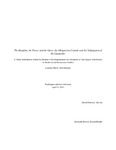| dc.rights.license | In Copyright | en_US |
| dc.creator | Simonis, Lorraine Marie Alice | |
| dc.date.accessioned | 2014-05-19T12:16:00Z | |
| dc.date.available | 2014-05-19T12:16:00Z | |
| dc.date.created | 2014 | |
| dc.identifier | WLURG38_Simonis_MRST_2014 | |
| dc.identifier.uri | http://hdl.handle.net/11021/27888 | |
| dc.description | Thesis; [FULL-TEXT FREELY AVAILABLE ONLINE] | en_US |
| dc.description | Lorraine Marie Alice Simonis is a member of the Class of 2014 of Washington and Lee University. | en_US |
| dc.description.abstract | The conditions, which range from the predictable (stop sheltering and employing those identified by clerics as Jews and heretics) to the seemingly arbitrary (no new taxes or tolls on roads) to the bizarre (no eating more than two types of meat at a time), reveal that the motivations for the crusade were many and varied. If one accepts the explanation that the crusade was simply a campaign against Catharism, for example, then the council's conditions seem bewildering and arbitrary. After all, what do taxes and tolls, or mercenaries, or meat or fancy fabrics have to do with heresy? Admittedly, at first glance, there does not appear to be much connection. If, instead, however, one considers the conflict not only within the religious context – particularly the church's concerns about Catharism – but also within the socio-political context of twelfth-century Christendom, then the Council of Arles' conditions seem far less eccentric and far more logical. Seen in this broader framework, a different image of the Albigensian Crusade emerges, an image of the crusade as not just a holy war or a land-grab, but as campaign against the economic, political, social and philosophical structure of the Languedoc. [From Introduction] | en_US |
| dc.format.extent | 77 pages | en_US |
| dc.language.iso | en_US | en_US |
| dc.rights | This material is made available for use in research, teaching, and private study, pursuant to U.S. Copyright law. The user assumes full responsibility for any use of the materials, including but not limited to, infringement of copyright and publication rights of reproduced materials. Any materials used should be fully credited with the source. | en_US |
| dc.rights.uri | http://rightsstatements.org/vocab/InC/1.0/ | en_US |
| dc.subject.other | Washington and Lee University -- Honors in Medieval and Renaissance Studies | en_US |
| dc.title | The Kingdom, the Power and the Glory: The Albigensian Crusade and the Subjugation of the Languedoc (thesis) | en_US |
| dc.type | Text | en_US |
| dcterms.isPartOf | RG38 - Student Papers | |
| dc.rights.holder | Simonis, Lorraine Marie Alice | |
| dc.subject.fast | Innocent III, Pope, 1160 or 1161-1216 | en_US |
| dc.subject.fast | Albigenses | en_US |
| dc.subject.fast | Crusades | en_US |
| dc.subject.fast | France-- Languedoc | en_US |
| dc.subject.fast | Church history | en_US |
| dc.subject.fast | Middle Ages | en_US |
| local.department | Medieval and Renaissance Studies | en_US |
| local.scholarshiptype | Honors Thesis | en_US |
